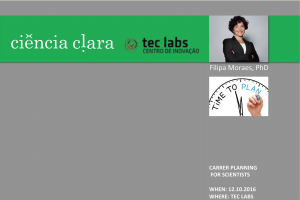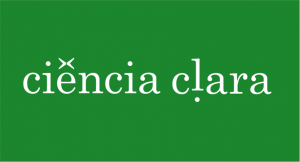Workshop de Gestão de Carreira para Cientistas.
O que fazer depois do PhD?
Avaliação pessoal e exploração de carreiras compatíveis com o nosso perfil profissional
(ENGLISH VERSION BELOW)
PÚBLICO-ALVO:
- Doutorandos e pós-docs de todas as áreas STEM (Science, Technology, Engineering and Mathematics)
- Coordenadores e Diretores de Programas Doutorais e de Programas de Mestrado.
- Empresas Farmacêuticas/BioTech que procurem desenvolver as competências (soft skills) dos seus trabalhadores.
OBJECTIVOS DO WORKSHOP:
- Como fazer um plano de carreira.
- Possíveis carreiras a considerar após o Mestrado /Doutoramento/Pós-Doutoramento
- Avaliação de competências e ramos de interesse.
Quando: 12 de Outubro 2016
Onde: Sala de formação do Tec Labs – Centro de Inovação
Duração: Manhã, das 9h30-12h
____________________________________________________________
WORKSHOP Career planning for Scientists.
What to do after your PhD?
Personal skills and values assessment; match with different career paths.
TARGET AUDIENCE:
Master, PhD students & Post/doctoral Researchers in STEM Research (Science, Technology, Engineering and Mathematic)
Coordinators of Masters and Doctoral Training programs
Biotech/Pharmaceutical Companies who want to provide soft skills training to their collaborators.
AIMS:
PhD students, Postdocs and staff scientists will actively learn more about their individual strengths, values and interests and they will be more knowledgeable about the job market and potential jobs to consider.
When: October, 12th
Where: Tec Labs – Innovation Centre training room
Duration: Morning, 9h30-12h
Please contact Filipa at filipa.moraes@cienciaclara.pt to get more information about this workshop or related topics.




![Talk Filipa Moraes [1413113]_REV_Page_2](https://cienciaclara.pt/wp-content/uploads/2016/07/Talk-Filipa-Moraes-1413113_REV_Page_2-1-300x225.jpg) Come and spend one morning at Tec Labs! Workshop developed at Yale University-USA, and adapted to European and Portuguese realities. The participants will get valuable resources to their professional development.
Come and spend one morning at Tec Labs! Workshop developed at Yale University-USA, and adapted to European and Portuguese realities. The participants will get valuable resources to their professional development.